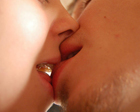 In his Psychology Today article “What’s in a Kiss?,” psychology professor Noam Sphancer explores “the kiss as ambassador and spy in sexual politics.” In this second posting on kissing abridged from his original article, Shpancer notes an interesting set of research findings related to gender differences in attitudes and expectations about kissing.
In his Psychology Today article “What’s in a Kiss?,” psychology professor Noam Sphancer explores “the kiss as ambassador and spy in sexual politics.” In this second posting on kissing abridged from his original article, Shpancer notes an interesting set of research findings related to gender differences in attitudes and expectations about kissing.
* * *
Several years ago, Robert Gallup (University of Albany) and his colleagues interviewed a thousand young Americans on the subject of kissing. The women participants ranked the kiss as more important in both short- and long-term relations. Men rated kissing as decreasing in importance over the duration of a relationship. Half of the men (compared to only 14% of women) said they would have sex with someone without kissing them first.
Both men and women reported that a good kiss was not, in and of itself, sufficient reason to develop a romantic relationship. But women in the study reported that the smell and taste of their kissing partner weighed heavily in their decision to continue kissing and to pursue a relationship. For the women, an unsuccessful first kiss could eliminate a potential partner from contention.
Gallup’s study also showed that men sexualized the kiss more than women. Men routinely expect that kissing will lead to intercourse, and feel more entitled to expect intercourse after kissing (particularly after “a good kiss”). Women reported often feeling pressured by men to engage in kissing, and after kissing pressured to engage intercourse.
In 2013, British researchers Rafael Wlodarski and Robin Dunbar of Oxford University published a study of more than 900 participants. Like Gallup and colleagues, they found that women attributed more emotional significance to kissing than did men; they were more likely to view kissing as an aid to, and expression of, relationship intimacy. The researchers found that women (at the beginning of a relationship) value a kiss more if they are ovulating, suggesting that kisses are used to collect information on the fitness of potential mates.
Another interesting nuance: Men and women who rated themselves as more attractive and who had more sexual experiences rated the kiss as more important, suggesting the use of kissing as a tool for mate selection and sexual seduction.
As regards short-term casual relations, participants found kissing more important before intercourse than during or after. For serious, long-term relationship, kissing before, during, and after sexual intercourse was deemed equally important.
Several years ago, family communcations scholar Kory Floyd and his colleagues at Arizona State University explored the role of kissing in improving the quality of long-term relationships. The researchers randomly assigned 52 participants (all involved in long-term relationships) to one of two groups and instructed the members of the experimental group to kiss their partners more frequently for a period of six weeks. Blood tests and questionnaire data collected before and after showed that members of the experimental group experienced decreased cholesterol, decreased stress, and improved quality of relationship.
Researcher Wendy Hill of Lafayette College in Pennsylvania similarly found that kissing for fifteen minutes led to a significant decline in the level of stress hormone cortisol in her study’s participants.
“Kisses are a better fate than wisdom,” wrote the poet e.e.cummings. Go to it!
* * *
See also: What’s in a Kiss? Part 1 (Noam Sphancer)